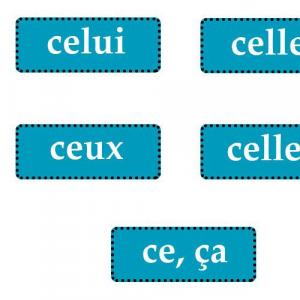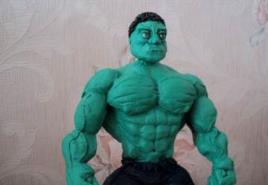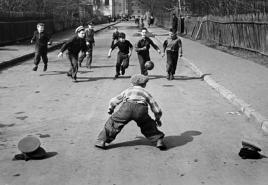The difference between Latin demonstrative pronouns and French ones. Demonstrative pronouns in French
Distinguish between inflected and invariable pronouns. Depending on the number and gender of the noun, a variable pronoun is selected, which is used in the sentence.
Celui/ celle (that/that) and ceux/ celles (te) are inflected demonstrative pronouns of a simple form. Using particles ci and là complex forms of variable demonstrative pronouns are formed, which indicate the location of an object or person in space in relation to the speaker.
Invariable demonstrative pronouns include Ce (C’) and ceci, cela, ça , equivalent to Russian " This ".
6.1 Inflected demonstrative pronouns (simple form)
Singular | Plural | ||
m.r. | w.r. | m.r. | w.r. |
celui | celle | ceux | cells |
Celui Qui arrivera le dernier n’aura pas un cadeau. - The one who comes last will not receive a gift. | Je préfère la bicyclette de Marie que celle de Jean. – I like Maria’s bike better than Jean’s. | Ceux Qui sont en pantalons sont mes collègues. – Those who are wearing pants are my colleagues. | Celles avec le chat sont mes copines. “The ones with the cat are my friends.” |
In general, modified demonstrative pronouns of a simple form are not used in isolation. They are followed by:
1) participle:
For example: Voici son dessin, voici celui reality par mon fils. - Here is his drawing, here is the one my son made.
2) addition with a preposition (most often de).
The demonstrative pronoun used in sentences of this type is usually not translated into Russian. Instead, the same noun is repeated that was replaced by a pronoun in the French sentence:
For example: Les chaussures de Michel sont noires, cells de Victor sont jaunes. - Michel's shoes are black, Victor's shoes are yellow.
3) relative subordinate clause:
For example: Je vous présente ceux qui ont triomphé ce matin.- I present to you those who won this morning.
6.2 Variable demonstrative pronouns (complex form)
Singular | Plural | ||
m.r. | w.r. | m.r. | w.r. |
celui-ci | celle-ci | ceux-ci | celles-ci |
celui-là | celle-la | ceux-là | celles-là |
Celui-là, on ne peut jamais compter sur lui. –This one, you can never count on him. | Quelle voiture préfères-tu? Celle-ci où celle-là? –What car do you like? This one or that one? | Pauline et les Ivanov ont travaillé ensemble dans le bureau des Ivanov, elle a passé trois heures dans le bureau de ceux-ci. –Polina and the Ivanovs worked together in the Ivanovs' office; she spent three hours in their office. | Parmi toutes les robes, pourquoi a-t-elle choisi celles-ci? –Why did she choose these among all the skirts? |
Particles ci and là indicate the distance of an object and person in space and time. Ci indicates what is closer in space, or replaces the noun that was mentioned last. Là - what follows or was mentioned earlier:
For example: Prenez celui-ci! - Take this one! (whatever is closer).
Prenez celui-là! - Take that one! (what comes next).
Jean et Anne étudient bien, mais celle-ci est plus appliquée. - Jean and Anna study well, but the latter (Anna) is more diligent.
6.3 Inflexible pronouns
1. Ce (c’) - “this”
Used as a subject with a verbêtre , for example, in the case of selection, when it follows:
* relative pronoun (qui, que, dont, …):
C'est la fille dont je t'ai parlée. - This is the girl I told you about.
Ce sont les artistes que nous avons vus au théâtre -These are the artists we saw in the theater.
* subject expressed by a noun:
Ah, c'est beau, l'amour! - Oh, this is beautiful, love!
Ce sont et c'est used before the names of professions and nationalities when introducing unfamiliar persons:
Ce sont des étudiantes. - These are students.
C'est un chanteur. - This is a singer.
Ce sont des Espagnols. - These are the Spaniards.
When introducing people you know, personal pronouns are used:
Elles sont etudiantes. - They are students.
Robert? Il est chanteur. - Robert? He is a singer.
Olga est espagnole. - Olga is Spanish.
2. Ceci, cela, ça - “this”
Used as a subject with all verbs except être; and also as a complement or nominal part of the predicate.
Cela semble normal - This seems normal.
- Votre chat avait ceci dans la gorge, dit le vétérinaire en montrant une grosse boule de fil -“Your cat had it in her throat,” the veterinarian said, showing a large wad of thread.
Cela replaces a previous sentence or idea and denotes a more distant object.
- On t'a dit que j'étais malade, cela est absolument faux - They told you that I was sick, that's not true.
Vu d'ici, cela est un animal et non une plante. - ABOUTHere it looks like an animal, not a plant.
Ceci - introduces an idea that will follow this statement and denotes a closer object.
Je vais te dire ceci - I'm going to tell you this.
Ceci est un vase précieux, pas un jouet -This is a precious vase, not a toy.
Ça replaces cela and ceci in colloquial speech, but rarely used in writing:
Manger en classe, ça ne se fait pas - You can't eat in class.
With the verb être cela may be replaced by ce:
Ce n'est pas tres gentil de ta part. -This is not very good of you.
6.4 Excellence
In sentences, find words that are replaced by pronouns
1. Quel vol choisis-tu? Le vol de main ou celui de mardi? ()
2. Cette revue n’est pas interior, je voudrais voir celle que lit mon voisin.()
3. Quelles sont vos valises, celles-là ou celles-ci?()
4. Tu aimes notre hôtesse? Celle qui nous a accueilli à l’entrée de l’avion? ()
************************************************************************************************************************
6.5. Devoir à la maison
Utilisez celui, celle, ce, ceux-là, ceux, celui-là, cela.
1. ………. Qui n'aura pas fini son travail à temps sera moins payé.
2. Laquelle des deux voitures préférez-vous ?............ de Pierre ou ……….. de Jean ?
3. Décidément, tu ne sais pas……….. que tu veux.
4. J'ai oublié de regarder la météo; j'ai pensé à tout sauf à ………….
5…………. Qui veulent participer à la sortie doivent s’inscrire.
6. Preférez-vous ce vêtement-ci, ou plutôt ………….?
7. Ces ouvriers-ci ont peu travaillé; mais…………. auront une prime, car ils ont fini le travail vite et bien.
Changeable pronouns
Simple forms
singular | plural |
||
| m.r. | w.r. | m.r. | w.r. |
celui | celle | ceux | cells |
| Celui qui arrivera le premier aura un cadeau. – The one who comes first will receive a gift. | Je prefère la voiture de Camille à celle de Jean. – I like Camila's car more than Jean's car. | Ceux qui sont venus partent ce soir. – Those who came leave in the evening. | Celles avec le chien sont mes copines. – ThoseWithdoggie- mygirlfriends. |
Never used in isolation. After them, be sure to follow T
1) participle:
Voici son dessin, voici celui realise par mon fils. - Here is his drawing, here is the one my son made.
2) addition with preposition(most often de).
The demonstrative pronoun used in sentences of this type is usually not translated into Russian. Instead, the same noun is repeated that was replaced by a pronoun in the French sentence:
Les chaussures de Michel sont noires, celles de Victor sont jaunes. - Michel's boots are black, boots Victor's - yellow.
3) relative clause:
Je vous présente ceux qui ont triomphé ce matin .- I present to you those,who won this morning.
Complex shapes
Can be used independently.
singular | plural |
||
| m.r. | w.r. | m.r. | w.r. |
celui-ci | celle-ci | ceux-ci | celles-ci |
celui-là | celle-la | ceux-là | celles-là |
| Celui-là, on ne peut jamais compter sur lui. – This one, you can never count on him. | Quelle voiture préfères-tu? Celle-ci où celle-là? – What car do you like? This one or that one? | Les Durand et les Ivanov ont passé trois semaines au chalet de ceux-ci. – The Durans and Ivanovs spent three weeks in the latter's chalet. | Parmi toutes les peintures, pourquoi a-t-il choisi celles-ci? – Why did you choose these among all the paintings? |
The particles ci and là indicate the distance of an object/person in space and time. Ci indicates what is closer in space, or replaces the noun that was mentioned last (in comparisons or homogeneous members of a sentence). Là- what follows or was mentioned earlier:
Prenez celui-ci! - Take this one!(whichever is closer).
Prenez celui-là! - Take that one!(what's next).
Marie et Anne travaillent bien, mais celle-ci est plus appliquée. - Marie and Anna study well, but the latter (Anna) is more diligent.
Invariable pronouns
1. Ce (c’) - “this”
Used assubject with the verb être, for example, in the case of selection, when it follows:
1. relative pronoun (qui, que, dont, ...):
C' est la fille dont je t'ai parle. - This is the girl I told you about.
Ce Sont les artistes que nous avons vus au théâtre. - These are the artists we saw in the theater.
2. subject expressed by a noun:
Ah, c'est beau, l'amour! - Oh, this is beautiful, love!
Ce sont and c'est are used before the names of professions and nationalities when introducing unfamiliar persons:
Ce sont des etudiantes. - These are students.
C' est un chanteur. - This is a singer.
Ce sont des Espagnols. - These are the Spaniards.
When introducing people you know, personal pronouns are used:
Elles sont etudiantes. - They are students.
Robert? Il est chanteur. - Robert? He is a singer.
Olga est espagnole. - Olga is Spanish.
2. Ceci, cela, ça - “this”
- Used as a subject with all verbs except être; and also as an addition or nominal part of the predicate:
Cela semble normal. - This seems normal.
Votre chat avait ceci dans la gorge, dit le vétérinaire en montrant une grosse boule de fil. - “Your cat had it in her throat,” the veterinarian said, showing a large wad of thread.
Elle sait conduire. Sans cela, elle ne pourrait pas réussir à faire tout ce qu'elle fait. - She knows how to drive a car. Without this, she would not be able to do everything she does.
- Cela replaces a previous sentence or idea; ceci - introduces the idea that will follow this statement:
On t'a dit que j'étais malade.<-
Cela
est absolument faux. - They told you that I was sick. It is not true.
Je vais te dire ceci. -I'm going to tell you this.
- Cela denotes a more distant object; ceci - closer:
Vu d'ici, celaest un animal et non une plante. -And from here it looks like an animal, not a plant.
Ceciest un vase précieux, pas un jouet.-This is a precious vase, not a toy.
- Ça replaces cela and cecispoken, but rarely used in writing:
Manger en classe, ça ne se fait pas. - You can't eat in class.
- With a verb être cela may be replaced by ce:
Cen'est pas très gentil de ta part. -This is not very good of you.
Pronouns are a fairly common part of speech used to construct sentences. One type of pronouns is demonstrative pronouns.
French demonstrative pronouns are used to distinguish a specific object from others, as well as to determine its characteristics or quantitative characteristics, to replace the corresponding noun. This group includes pronouns such as celui (this or that), ce (this), celui-ci (this), celui-là (that), cela (this, that), ceci – this, etc. Depending depending on inflection, they are indeclinable (they agree in gender and number with the noun) and indeclinable.
The demonstrative pronoun celui (masculine) has the following forms:
- Celle – this, that (feminine)
- Ceux – these (masculine and feminine gender or masculine plural),
- celles – these (feminine plural).
See similar topics:
Usually it is not translated into Russian, or it is translated using the word it replaces, depending on the situation and context.
For example:
celui que vous voulez visiter - the one you want to visit.
Celle que je cherche longtemps is the one I've been looking for for a long time.
Les revue hebdomadaires arrivent ici le soir et ceux quotidiennes le matin - weekly magazines arrive here at night, and daily magazines in the morning. (as we see, in the 2nd part there is no noun “magazines” replaced by a demonstrative pronoun).
Often this French demonstrative pronoun is used in set phrases or phrases, in particular, in proverbs or business phrases used in official documents, and therefore loses its direct meaning. The most common such phrases are the following:
ceux de l'âge - same age, peers,
parmi ceux-ci citons – from this number it is necessary to select,
celui-la en vaut quinze! - what a class! Simply wonderful!
selon celle des dates qui survienne la première – depends on which date comes first.
To denote the pronoun “this”, the French demonstrative pronoun celui-ci is also used, (celle-ci – this, celles-ci – these (implies the feminine gender), ceux-ci (implies either the masculine gender, or the feminine and masculine gender together), and to denote the pronoun “that” - celui-là. Having forms similar to the above pronoun, namely celle-là - that, celles-là - those, ceux-là - those. These pronouns can be used in a sentence independently, as well as to designate object or subject that is closer to the speaker. For example:
Ceux-ci se levent, ceux-là se couchent - these get up, those fall asleep.
Il ne s’attendait pas voir à celle-là – he did not expect to see this.
Also one of the most widely used demonstrative pronouns is the pronoun ce - that is, that which retains its form regardless of gender and number. It is used both independently (for example, ce me semble que je dois le dire - I think I need to tell him about this), and in constructions or sentences with être, most often to enhance emphasis (c'est le travail qu' il doit faire demain - this is the work he must do tomorrow), in fixed phrases (for example, si ce n'est - unless you count, ce n'est pas de refus - expressing your consent to something, compte tenu de ce qui précède dans le texte – taking into account everything stated above in this document). This pronoun is also used in the formation of complex interrogative pronouns or interrogative particles in French, for example: Qu’est-ce que nous faisons? - what are we doing? Le soleil brille n’est-ce-pas? – the sun is shining, isn’t it?
Pronoun ceci – this, cela – that, ça – this most often used as a subject, the exception in this case is the verb être, with which they are not used, as well as to replace the previous phrase, phrase or sentence, or simply in set phrases. For example:
ceci n’est pas négociable – not subject to discussion (consideration),
cela ne fait rien – no need to worry about anything!
For fans of the French language, distance French tutors will be useful.







